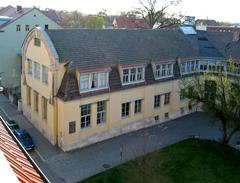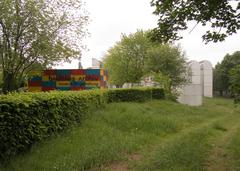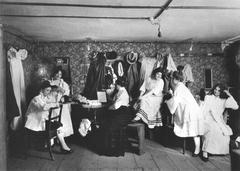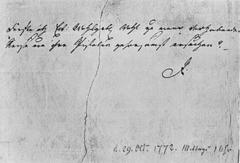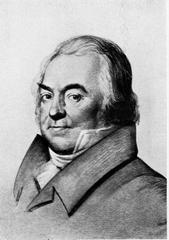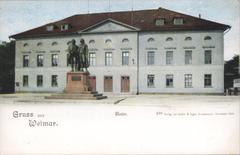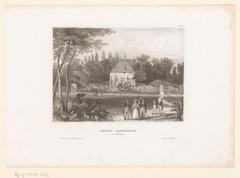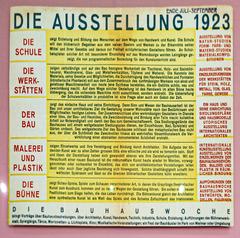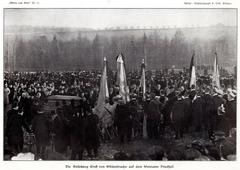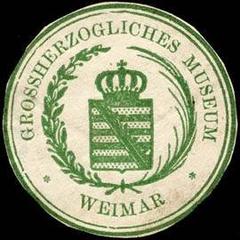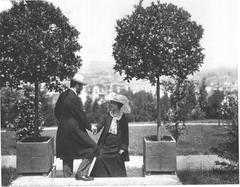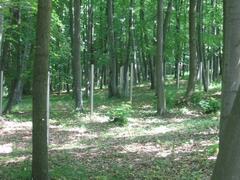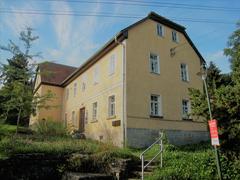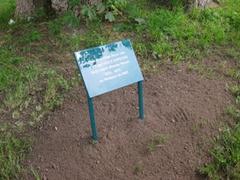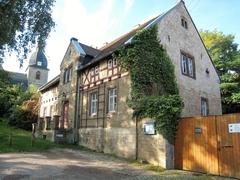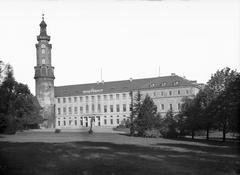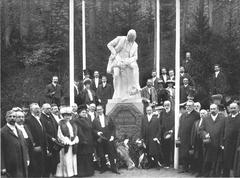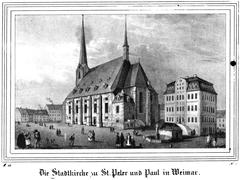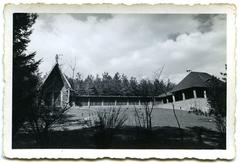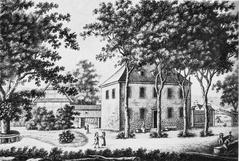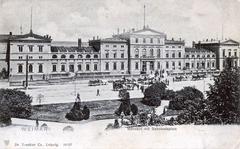
Haus der Weimarer Republik: Visiting Hours, Tickets, and Visitor Information in Weimar, Germany
Date: 04/07/2025
Introduction
Situated on Weimar’s historic Theaterplatz, the Haus der Weimarer Republik is a dynamic museum and civic forum dedicated to Germany’s first democracy. More than a collection of artifacts, the museum immerses visitors in the story of the Weimar Republic (1919–1933)—from its progressive constitution and vibrant culture to its struggles and ultimate collapse. Through thoughtfully curated exhibitions, interactive media, and an active program of events, the Haus der Weimarer Republik invites visitors to reflect on the significance of democracy, the lessons of history, and their relevance today. This guide provides all the essential visitor information, including opening hours, ticket details, accessibility, and nearby attractions, ensuring you make the most of your visit to this pivotal Weimar landmark (hdwr.de; im-weimarer-land.de; Detail; whichmuseum.com).
Table of Contents
- Introduction
- Historical Context and Cultural Significance
- Architectural Evolution of the Museum
- Visiting Information
- Exhibitions and Educational Programming
- Special Events and Guided Tours
- Visitor Tips and Nearby Attractions
- Frequently Asked Questions (FAQ)
- Conclusion
- References
Historical Context and Cultural Significance
The Birth of the Weimar Republic
After World War I, Weimar was chosen as the site for the German National Assembly, leading to the drafting of the Weimar Constitution in 1919. The republic was an unprecedented experiment in parliamentary democracy, granting civil rights and suffrage, including to women, and fostering a fertile ground for cultural innovation. The Haus der Weimarer Republik, located directly opposite the Deutsches Nationaltheater (the Assembly’s meeting place), anchors this pivotal moment in German history (im-weimarer-land.de; whichmuseum.com).
Turbulence, Culture, and Legacy
The Weimar Republic era was marked by dramatic political and social turbulence—hyperinflation, uprisings, and the rise of extremism. Yet, it was also a time of remarkable cultural renaissance: the Bauhaus movement, revolutionary cinema, and vibrant urban life flourished in Weimar and beyond. The museum explores both the achievements and challenges of the republic, culminating in its downfall and the lessons still relevant to contemporary democratic societies (im-weimarer-land.de; theartssociety.org).
Architectural Evolution of the Museum
Historic Origins
The building housing the Haus der Weimarer Republik was constructed in 1823 as a neo-Classical carriage depot (Wagenremise) by Clemens Wenzeslaus Coudray. Over the years, it has witnessed multiple uses—from royal stables to stage set storage, art gallery, and the former Bauhaus Museum (ArchDaily; Divisare).
Modern Transformation
Between 2019 and 2023, Stuttgart-based Muffler Architekten renovated and expanded the building, blending original features with contemporary architecture. Key highlights include:
- Preserved neo-Classical façade and restored stonework, maintaining the symmetrical proportions facing Theaterplatz.
- Contemporary glass-and-steel addition at the rear, connected by a glazed passage offering barrier-free access throughout.
- Integration of historic structures, including remnants of the old Weimar armory at the garden level, creating a palpable sense of layered history (Detail; STIRworld).
Urban Significance
As the anchor of the revitalized Zeughofquartier, the museum’s location connects Weimar’s democratic and cultural heritage, flanked by the Deutsches Nationaltheater, the Bauhaus Museum, and the Goethe-Schiller Monument (Weimar.de; boomyourstory.com).
Visiting Information
Opening Hours
- April–October: Monday to Sunday, 09:00–19:00
- November–March: Tuesday to Sunday, 10:00–19:00
- Closed: December 24–26 and December 31–January 1
Check the official website for special event or holiday hours.
Tickets and Admission
- Adults: €7
- Reduced: €4.50 (students, seniors, etc.)
- Free: Children under 14, students, WeimarCard holders
- Group tours: €75 per group (plus admission), 60 minutes
- Free admission on the first Sunday of each month
Tickets can be purchased onsite or online via the museum website.
Accessibility
- Fully wheelchair accessible: elevators, ramps, and accessible restrooms throughout
- Multilingual exhibition texts (German/English); other languages on request
- Assistance available for visitors with disabilities (Detail)
Getting There & Parking
- Location: Theaterplatz 4, 99423 Weimar
- Public Transport: Short walk from Weimar main train station; local bus stops nearby
- Parking:
- Parkhaus Hauptpost (5 min walk)
- Tiefgarage Beethovenplatz (7 min walk)
- Atrium parking garage (10 min walk)
- Free parking at Hermann-Brill-Platz (15 min walk)
Car access directly to the museum is not available—public transport or walking is recommended (hdwr.de).
Exhibitions and Educational Programming
Permanent Exhibition
- Thematic Chapters: Covering the origins, constitution, political and social life, crises, culture (Bauhaus, cinema), and the Weimar Republic’s demise.
- Media & Artifacts: Original documents, photographs, multimedia stations, audio guides, and interactive installations.
- Family Engagement: Activity booklets and scavenger hunts for younger visitors; cinema room for introductory films.
- Languages: German and English, with additional translations planned (whichmuseum.com).
Special Exhibitions
- “Freiheit in Bewegung – Sport in der Weimarer Republik” (April 11, 2025 – January 12, 2026)
- “Gewalt gegen Weimar. Zerreißproben der frühen Republik 1918–1923” (October 25, 2024 – March 9, 2025)
Educational Programs
- Workshops, lectures, and debates in the Forum für Demokratie
- Tailored programs for schools, military, and community groups
- Outdoor events in the Künstlergarten during summer (hdwr.de)
Special Events and Guided Tours
- Guided tours (German/English) available for individuals and groups by prior arrangement
- Cultural events: Concerts, readings, panel discussions, and film evenings in the Künstlergarten and indoor spaces
- Multimedia installations enhance the visitor experience
- Photography: Allowed without flash or tripods in most areas
Visitor Tips and Nearby Attractions
- Combine with other sites: Deutsches Nationaltheater, Bauhaus Museum, Goethe’s House, and Anna Amalia Library are all within walking distance (Tall Girl Big World)
- Duration: Allocate 1.5–2 hours for a full visit
- Book ahead: For tours or during peak times, reserve tickets online
- Café & Shop: Enjoy local refreshments and browse curated books and souvenirs
- Best photo spots: The historic façade, glass extension, and tranquil Künstlergarten
Frequently Asked Questions (FAQ)
Q: What are the Haus der Weimarer Republik visiting hours?
A: April–October: daily 09:00–19:00; November–March: Tuesday–Sunday 10:00–19:00; closed on major holidays.
Q: How much do tickets cost?
A: €7 standard, €4.50 reduced, children under 14 and certain groups free; guided tours extra.
Q: Is the museum accessible?
A: Yes, fully barrier-free with elevators and accessible restrooms.
Q: Are guided tours available?
A: Yes, in German and English, bookable in advance.
Q: Can I take photos?
A: Yes, in most areas (no flash/tripods).
Q: What other attractions are close by?
A: Bauhaus Museum, Deutsches Nationaltheater, Goethe’s House, and more.
Conclusion
The Haus der Weimarer Republik is a cornerstone of Weimar’s cultural landscape, offering a nuanced, interactive exploration of Germany’s first democracy. With its blend of historic architecture and modern design, engaging exhibitions, accessible facilities, and vibrant cultural program, it is a must-visit for anyone interested in history, architecture, or civic life. Plan your visit today by consulting the official museum website for hours, tickets, and event details.
Enhance your experience by downloading the Audiala app for guided tours and multimedia content, and follow the museum on social media for the latest updates and events.
References
- Haus der Weimarer Republik – Official Website
- Das Haus der Weimarer Republik und seine historische Bedeutung – im-weimarer-land.de
- Haus der Weimarer Republik von Muffler Architekten – Detail
- House of the Weimar Republic: Architectural Blend of Past and Present – STIRworld
- Haus der Weimarer Republik: Visiting Hours, Tickets, and Architectural Highlights in Weimar – Divisare
- Discover the Haus der Weimarer Republik: Visiting Hours, Tickets, and What to See – whichmuseum.com
- Nach wie vor eine starke Resonanz – weimarer-republik.net
- Best Things to Do in Weimar, Germany – tallgirlbigworld.com
- Preserving Heritage: House of the Weimar Republic by Muffler Architekten – boomyourstory.com


